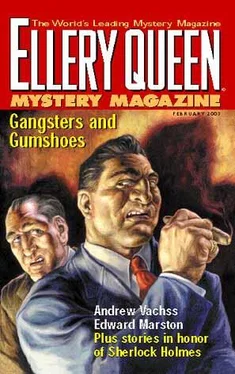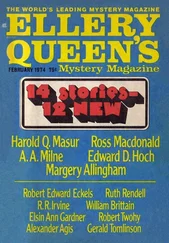Артур Порджес - Ellery Queen’s Mystery Magazine. Vol. 121, No. 2. Whole No. 738, February 2003
Здесь есть возможность читать онлайн «Артур Порджес - Ellery Queen’s Mystery Magazine. Vol. 121, No. 2. Whole No. 738, February 2003» весь текст электронной книги совершенно бесплатно (целиком полную версию без сокращений). В некоторых случаях можно слушать аудио, скачать через торрент в формате fb2 и присутствует краткое содержание. Город: New York, Год выпуска: 2003, ISBN: 2003, Издательство: Dell Magazines, Жанр: Детектив, на английском языке. Описание произведения, (предисловие) а так же отзывы посетителей доступны на портале библиотеки ЛибКат.
- Название:Ellery Queen’s Mystery Magazine. Vol. 121, No. 2. Whole No. 738, February 2003
- Автор:
- Издательство:Dell Magazines
- Жанр:
- Год:2003
- Город:New York
- ISBN:1054-8122
- Рейтинг книги:5 / 5. Голосов: 1
-
Избранное:Добавить в избранное
- Отзывы:
-
Ваша оценка:
- 100
- 1
- 2
- 3
- 4
- 5
Ellery Queen’s Mystery Magazine. Vol. 121, No. 2. Whole No. 738, February 2003: краткое содержание, описание и аннотация
Предлагаем к чтению аннотацию, описание, краткое содержание или предисловие (зависит от того, что написал сам автор книги «Ellery Queen’s Mystery Magazine. Vol. 121, No. 2. Whole No. 738, February 2003»). Если вы не нашли необходимую информацию о книге — напишите в комментариях, мы постараемся отыскать её.
Ellery Queen’s Mystery Magazine. Vol. 121, No. 2. Whole No. 738, February 2003 — читать онлайн бесплатно полную книгу (весь текст) целиком
Ниже представлен текст книги, разбитый по страницам. Система сохранения места последней прочитанной страницы, позволяет с удобством читать онлайн бесплатно книгу «Ellery Queen’s Mystery Magazine. Vol. 121, No. 2. Whole No. 738, February 2003», без необходимости каждый раз заново искать на чём Вы остановились. Поставьте закладку, и сможете в любой момент перейти на страницу, на которой закончили чтение.
Интервал:
Закладка:
“I tell ye again,” the boy said. “Naebody, nae mon, nae bairn went intae tha hoose. Only Clarke, the gamekeeper.”
Further questioning could not shake him, and he was not capable of serious deception, we all realized.
After that, the inspector brought us Micah Clarke. There was nothing stupid about him. Small, very alert, with bright blue eyes, he moved like one of James Fenimore Cooper’s redskins, able to walk on dry leaves, I thought, without making a sound. He spoke slowly, calmly, quietly, with complete assurance. Only when Gerard brought up the matter of Sue Fone did his demeanor suddenly change. His blue eyes became cold and steely, and he said bitterly, “That was an evil act by Sir Nigel; a very evil act, and I cannot mourn his death.” Homes seemed oddly indecisive, as if unwilling to press the man, but finally he asked about Clarke’s repeated visits to the house.
“Sir Nigel was concerned about poachers,” he said, a faint Lancashire accent in his voice. “He kept sending me out for evidence I’d been finding — you know, shell casings and such.”
“The gardener mentioned your carrying packages each time,” Homes said, a question in his words.
“Ah, yes. Well, yes. Those were evidence, the empty shells, some skins where the poachers had taken rabbits. Even grouse feathers.”
Homes gave him a sharp glance, then turned to Gerard and me. “I suggest we three have a conference outside.” Then to Clarke, “Thank you, Micah; you may go, but please stay on the grounds. I may have more questions.” The gamekeeper, his hatchet face expressionless, nodded.
Once we were outside in the garden, Homes looked around, apparently to make sure nobody was in earshot. But there was only the gardener, pruning some shrubs quite far away.
Satisfied, Homes said, his face dark, “What rubbish! I sense a high intelligence and great determination behind this crime, so why such a puerile story about poacher evidence? Poachers leave little or none, and certainly not several big parcels full. Gentlemen, there is a key point here that eludes me. I must have more data. Let’s go back inside. I want to examine the carpet more thoroughly; the killer must have left his traces there.”
In the musty parlor, Homes raised the blinds to let the full afternoon sunlight strike both the carpet and the figurine. He studied the bronze again, using his magnifying glass, then gave a little grunt, but before we could ask about what, if anything, he’d discovered, he dropped to all fours and began to scrutinize the rug, inch by inch. He reminded me, not for the first time, of a blooded hound on the spoor of a wily fox. Then suddenly he froze and delicately picked up something. He looked at it with his magnifying glass, and then arose, handing it to Gerard.
“What do you make of this, Inspector?”
Gerard studied, and smiled. “What do I make of it? Very likely to turn up around a dedicated grouse hunter, Mr. Homes. It’s just a lead shot. Tells us nothing. Only a townie would be puzzled by it,” he added with some malice.
But Homes’s face was oddly bright. “By heaven,” he cried, “all is becoming clear.” He hurried to the bronze, magnifier in hand, scrutinized the back, and taking out his handkerchief, briskly rubbed it. “Aha! As I thought.” He motioned to us, and we hurried to join him. “See that, the round patch about two inches in diameter?”
It was plain to see, but what could it mean? He caught the unspoken question, and smiled. “When I first examined the bronze, it was obvious that it had been cast in two parts. I could detect the seam. But it didn’t occur to me then that the statue was originally hollow, the liquid metal having been poured, as is often done, over a heat-resistant core — firebrick or the like. This murder was devilishly well planned by a man thirsting for revenge.”
He strode towards the sideboard muttering, “I’m sure I saw — ah, here it is,” and returned with a large horn-handled hunting knife. With it, he began to jab strongly at the round patch, which quickly crumbled away to reveal a hole in the bronze. My friend thrust the point of the blade into it, then pulled the knife out to display a lead shot impaled on the tip.
“The final proof!” he exulted. “The clever devil — do you see how it was done?” Then, without waiting for a reply, which might have been slow in coming, since neither the inspector nor I had one, he said, “Clarke, determined to avenge Miss Fone, having noted the figurine, a perfect bludgeon, soon realized there was a way to clear suspicion from himself. How? By making the statue far too heavy for even a very strong man to swing repeatedly. From its heft, he inferred, rightly, that it must be hollow. Convinced of that, he killed Loring with a number of blows, then used a chisel to make a round opening in the back. Making frequent trips, which puzzled Stone but couldn’t be avoided, he brought boxes of lead shot, which any gamekeeper would have in abundance what with all the grouse hunts, into the house, poured them into the figurine — only a few feet from his victim, mind you — and probably tamped them down so that no rattling sound would be heard if anybody moved the bronze, as indeed I did, you’ll recall. After righting the now very heavy figurine, he made a makeshift patch of plaster of Paris or putty, and covered it with dust so that nobody not hunting for it would suspect anything. A brilliant job, I have to say, and one that he almost got away with.”
I was deeply moved by this miracle of close reasoning, a masterpiece of deduction. This man will never age, I thought — how the devil does he do it? — and I combed my black beard with my fingers in a kind of agitation.
As for Inspector Gerard, he seemed dazed. He mumbled something I couldn’t hear, then said almost to himself, “No demmed elusive giant, after all; lummy!” Then, “I must arrest Clarke; it’s the hangman for him.”
“I take no joy in that,” Homes said somberly, “but there can be no excusing cold-blooded murder.”
He gave me a long, strange stare. “Now I’ve a personal mystery to resolve.”
“What is that?” I asked.
“Where the deuce is my violin?”
I had no reply, but could feel myself blushing. And I resolved then and there to suffer his playing with no more childish tricks. After all, there are worse sounds than my friend’s discordant, ear-splitting solos — or are there?
Copyright © 2002 by Arthur Porges.
Contraband
by Raymond Steiber
We close this issue with the last Raymond Steiber story submitted to EQMM prior to the author’s death in 2000. Unless stories we have not yet seen should be discovered by his executors, this is, sadly, the last time we will be able to treat our readers to an original work by this talented purveyor of mystery, adventure, and intrigue. It is our hope that someday someone will bring out a collection of the best of the Steiber stories.
Start with names. That’s the best way.
Mine’s Bill Riley, and I work for Blue Grass Investigations in Lexington, Kentucky. BGI is owned and operated by Lew Wallace — no relation to the guy that wrote Ben-Hur, but he’d certainly claim it if he thought about it.
BGI’s just Lew, me, and a full-time secretary, and what with a couple of moonlighting cops, that’s all we need. We do auto-insurance work mostly — hunting up witnesses, checking out claimant’s stories — and since I-75, one of the most heavily trafficked roads in the country, runs right past our doorstep, we stay pretty busy.
What else do you need to know about me? This, I guess: About ten years ago I went deaf for a while. I’d been having trouble with a buzzing in my ears, and then overnight I completely lost my ability to hear. They put me in a school for the deaf where I learned to sign and read lips. In time, I had a couple of operations, and now, with the help of a hearing aid, I’m pretty close to normal.
Читать дальшеИнтервал:
Закладка:
Похожие книги на «Ellery Queen’s Mystery Magazine. Vol. 121, No. 2. Whole No. 738, February 2003»
Представляем Вашему вниманию похожие книги на «Ellery Queen’s Mystery Magazine. Vol. 121, No. 2. Whole No. 738, February 2003» списком для выбора. Мы отобрали схожую по названию и смыслу литературу в надежде предоставить читателям больше вариантов отыскать новые, интересные, ещё непрочитанные произведения.
Обсуждение, отзывы о книге «Ellery Queen’s Mystery Magazine. Vol. 121, No. 2. Whole No. 738, February 2003» и просто собственные мнения читателей. Оставьте ваши комментарии, напишите, что Вы думаете о произведении, его смысле или главных героях. Укажите что конкретно понравилось, а что нет, и почему Вы так считаете.












